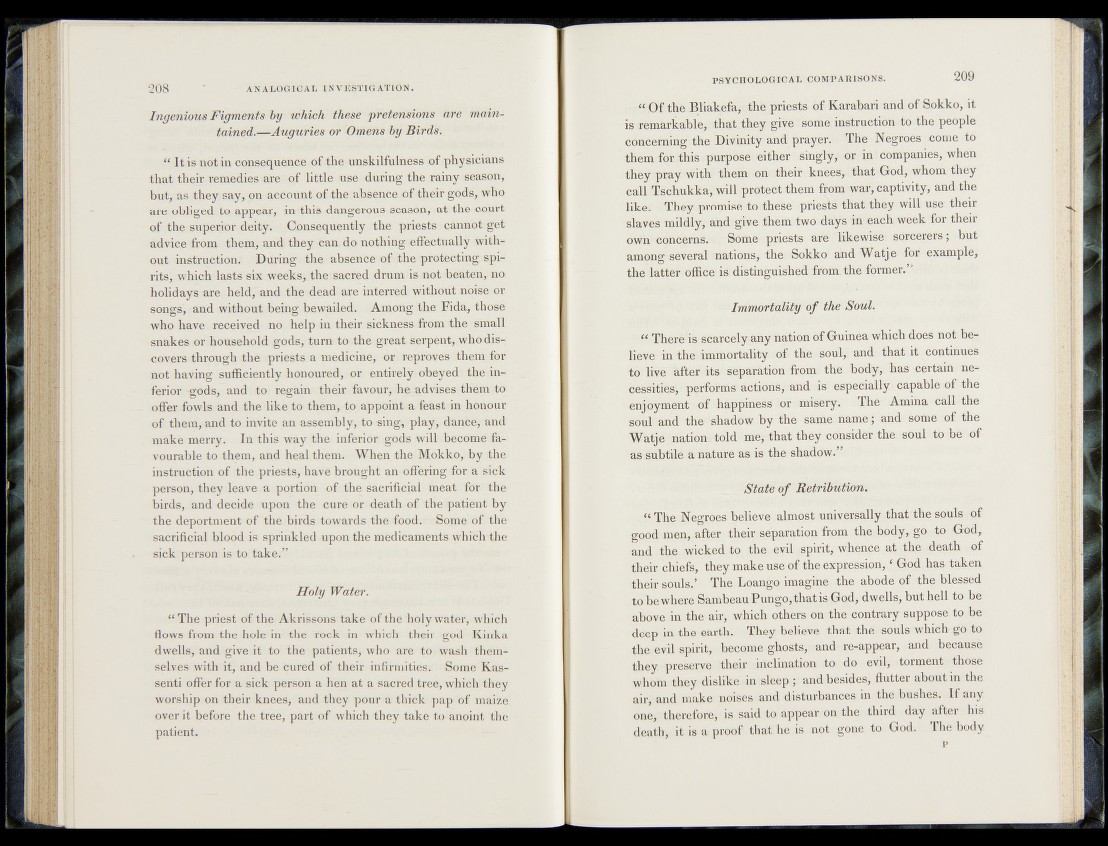
Ingenious Figments by which these pretensions are maintained.—
Auguries or Omens by Birds.
“ It is not in consequence of the unskilfulness of phy sicians
that their-remedies are of little use during the rainy season,
but, as they say, on account of the absence -of their gods, who
are obliged to appear, in this dangerous season, at the court
of the superior deify. Consequently the priests cannot get
advice from them, and they can do nothing effectually without
instruction, During the absence of the protecting spirits,
which lasts six weeks* the sacred drain is not beaten, no.
holidays are held, and the dead are interred without noise or
songs, and without being bewailed. Among the Fida, those
who have received no help in their sickness from the small
snakes or household gods, turn to the great serpent, , who discovers
through the priests a medicine, or reproves them for
not having sufficiently honoured, or entirely- obeyed the inferior
gods, and to regain their favour, he advises them to
offer fowls and the like to them, to appoint a feast in honour
of them, and to invite an assembly, to sing, play, dance, and
make merry. In this way the inferior gods will become fa-
veurable to them, and heal them. When the Mokko, by the;
instruction of the priests, have brought am offering for a sick
person, they leave a portion of the sacrificial meat for» the
birds, and decide upon the cure or death of the patient by
the deportment o f the birds towards the food.- .Sorne; of the»
sacrificial blood is sprinkled upon the medicaments which the
sick person is to ta k e /’
Holy Water.
“ The priest of the Akrissons take of the holy water, which
flows from the hole in the rock in which their god Kinka
dwells, and give it to the patients, who are to wash themselves
with it, and be cured of their infirmities; Some Kas-
senti offer for a sick person a hen at a sacred tree, which they
worship on their knees, and they pour a thick pap of maize
over it before the tree, part of which they take to anoint the
patient.
.. «O f the Bliakefa, the.priests of Karabafi and of Sokko, it
is remarkable, : that they give some instruction , to the people
concerning the Divinity-and prayer. The Negroes néme to
them for this purpose either < singly, or in companies', when
they pray with them on their. knees,; that God, whom they
call Tsc-hukka, w ill protect them from-war, captivity, and the
like. - They promise *to these priesls that- they will, use their
slaves mildly, and give fhem two days in each week for their
own concerns. Some priests; aife likewise* sorcerers; but
among several nations, the Sokko; a&id Watjecfeif example,
the latter office is distinguished from, the former/" -
Immortality o f the Soûl.
“ Therèm sèarcely any nation of Guinea- whiçh does nofcbe-
lieve in the immortality of the jj Soul;- and that- it continues
to live after its/; separation fromJ the body, has .certain necessities,
performs actiönè, and-is especially capable o f the
enjoyment of happiness Or misery. The Amina calhthe
soul and the shadow by the same Uame:;- and some1 of the
Watje nation-told-,me, that they consider.the-soul to be of
as subtile a; nature as. is the shadow.”
State o f RètributiÖn.
« The Ifegr^es believe almost universally that "the souls pf
good men, after their separation from the, $ g d ,
and the wicked to the evil spirit,;, whence ajt ifhe.; death . of
their chiefs, they make use of the expre^sm^.God,lias taken
their souls/ The Loango imagine the abode of the blessed
to bewhere SambeauPungo, thatis God, dwells, but hell to be
above in the air, which others on the contrary suppose to be
deep in the earth. They believe that the .’i&obla'which,gffto
the evil spirit, become ghosts, and-rerappear, and> because
they preserve their inclination to do - evily torment those
whom they dislike inssleep ; and besides, flutter about m the
air, and: make noises and disturbances in thedsakshes. If any
one, 'therefore, I ,is said to appearromthe1 third day after his
death, it is a proof that he .is not gone to God-/! The body
p